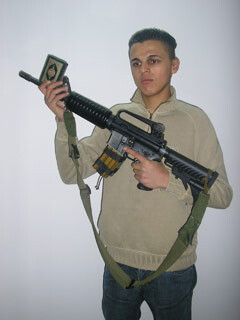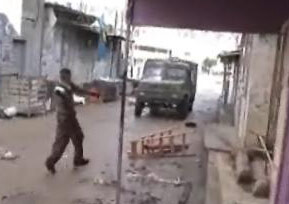London, United Kingdom 4 February 2008

From stone thrower to armed resistance fighter: Sanaqra felt it was his right to resist frequent Israeli army invasions into the Balata refugee camp. (Unknown)
When I read the email sent from a friend at 10:23am that stated “I don’t know if you heard, Ahmed Sanaqra was killed yesterday in Balata,” my fist clenched and hit the wall. As grief and deep rage took hold of me, an inner part of me wanted — needed — to do something immediate and direct, to shake everything, to halt “normality” with a scream. Yet the world went on as before, with no break in the emails, shopping, fixing a leaking boiler, meetings. London continues as usual, and on Friday morning a friend was gunned down because he said, “I will not submit.”
Ahmed Sanaqra, nicknamed “Sanquur” by most of Balata, was chatting with three friends in his family’s house early on that Friday morning. Outside, undercover Israeli gunmen disguised as Palestinians quietly moved through the alleyways, surrounding his house. Spotting Sanquur through the window, the gunmen opened fire, seriously wounding him. He tried to escape with his friends, but was too injured to keep moving. The Israelis chased him down and fired more bullets into his body, before leaving him to bleed to death.
Running through the alleyways
My flat in Balata overlooked the entrance to the camp, and thus oversaw most Israeli invasions. Sanquur and his friend Bilal would climb the three stories of my building to the roof where they threw bricks and rotten melons onto the armored jeeps passing below. The two of them would run right up to the jeeps’ windows, to cover them in paint to obstruct the soldiers’ view. When the Israeli soldiers tried to shoot at people in the street, Sanquur would take shelter in the alleyway next to my flat.

A still from a film produced by the Balata film collective shows Sanqra throwing paint at an Israeli army vehicle invading Balata.
Sometimes we ran through the alleyways together in the dark, in search of the invading jeeps. We often ended up sheltering behind the same wall when the soldiers opened fire, and we’d search for more stones to throw when supplies invariably ran out. One evening Sanquur harshly pulled me back into an alleyway just as a volley of bullets hit the wall where I had been standing, spraying shards of shrapnel and cement at us. A week later, I felt a large explosion as I walked down the main market street. Immediately afterwards I saw Sanquur running with blood streaming down his face. An unexploded bomb had gone off as he bent over to look at it. We bundled him into a car bound for the hospital.
Beating the odds
Sanquur was eighteen when I was deported. In the two-and-a-half years since, he became an armed resistance fighter with widespread support in Balata. Unlike some other fighters, he refused to be bought off or to submit, believing that when the Israeli army invaded Balata’s streets and alleyways, the residents of the camp were justified to defend themselves. He felt that this right to resist could not be signed away in exchange for a salaried job as a police officer.
Nobody from Balata has carried out a suicide attack since the Abu Ayyesh and Abu Saleem boys attacked a settlement in the West Bank in the spring of 2003. Yet the fighters who refuse to submit and continue their armed resistance against invading tanks and jeeps are systematically hunted down, one by one.
Sanquur survived at least three direct assassination attempts by the Israeli army. In April 2007, his younger brother was killed and Sanquur was shot in the hand and stomach, but he got away by running faster than the soldiers. While still in intensive care, the army raided the hospital but Sanquur climbed out of bed and escaped.
In 2006, the main police station, barely standing after six years of Israeli F-16, Apache, and tank bombardment, was bulldozed and flattened on top of him. Sanquur lay silent in the rubble for three days while soldiers walked on the ground above him. His escape, despite the odds, allowed an unlikely glimmer of hope to survive in Balata. His survival began to symbolize Balata’s tenacity to contine to struggle, or sumoud (steadfastness). Camp residents clutched tight to the belief that, unlike everybody else who has been killed or imprisoned, Sanquur would survive, free.
Carry on fighting
Dreams end. Last Friday, the undercover Israeli Duvdevan unit cornered and executed Sanquur. I haven’t worked out yet how to grieve when my friends are blown apart by rockets or receive a bullet in the head, even though it happens time and time again. Hani Hashash, Disco Skipper, and Mohammed Abu Lel were all friends and resistance fighters.
My rage wants to consume me, but it has no target. Hours after reading that Sanquur had been executed, fury made me shake as my bus passed through the city of London. I don’t want to choke it down, to not feel.
African-American author and activist bell hooks describes rage as “a necessary aspect of resistance struggle,” but what to direct it at? These feelings don’t translate into writing a letter to my MP, or taking part in a demonstration. The continuity in daily life fuels the fury, demanding a rupture, a break in our privilege and comfort of pubs, movies, shops — life and business as usual.
Honestly, I don’t know how to live with my grief and rage. The only answer I have is: if our political struggles are effective and fulfilling, to throw ourselves into them wholeheartedly. Together with our friends who are still alive and feeling, to hold each other up and carry on fighting.
The world is faced with oppression and occupation from countries like the UK, US, and Israel. Death and murder have been, and will be felt by many of our movements for liberation and justice. Mostly, when these struggles take place in England, we have the privilege of our friends not being gunned down beside us. Not so in Palestine, Derry and Belfast, Bolivia, Nigeria, or Iraq. We will lose more friends. There will be grief, fury, and rage with no outlet, but that’s part of struggling for a better world, I guess.
Mika Minio-Paluello is a community activist who lived and worked in Balata refugee camp between 2003 and 2005, supporting balatacamp.net and the Balata Film Collective. He currently lives in London and can be contacted at mika AT balatacamp DOT net.
Related Links


